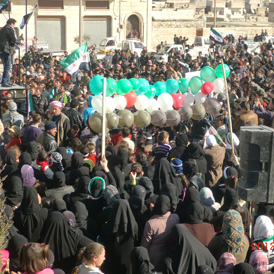Syria and the west ‘running out of options’
While the Syrian government bombards Homs, what is the international community doing? Channel 4 News looks at what is happening on the surface and behind the scenes – and why.
At the weekend, Russia and China vetoed a draft UN resolution condeming the escalating violence in Syria.
Since then, the increase in aggression against people in Homs suggests Syria’s President Bashar al-Assad has taken the veto as an indication he has heavyweight international support.
That is unlikely to have been the intention of China or Russia, experts told Channel 4 News.
Russia and CIS analyst at IHS Jane’s Lilit Gevorgyan said the move could in fact backfire for Russia, which is also facing its own nascent uprising.
“At stake is the reputation of Russia, and China. If Assad takes the veto as carte blanche, I think this will be a stain on Russian diplomatic efforts. Russia fought so hard to mitigate the security council vote and if the death toll in Syria rises, then this would reflect badly on Russian diplomacy.”
If Assad takes the veto as carte blanche, I think this will be a stain on Russian diplomatic efforts. Lilit Gevorgyan
Earlier the head of the Arab League warned that the Syrian army’s use of heavy weapons against civilians may edge the country towards civil war, a highly worrying prospect for a strategically sensitive country.
US presidential hopeful Newt Gingrich has called for covert action against Syria, something Syria expert Jane Kinninmont, from the Chatham House think-tank, told Channel 4 News is likely to be “being discussed in more than one capital at the moment”.
China and Russia have both defended their decisions not to back the draft UN resolution which was drawn up by the Arab League with the backing of several Arab nations including Libya and Egypt.
But analysts still believe there may be time to change China’s and Russia’s position so they may abstain from a vote as they did for resolution 1973, which sanctioned action against Libya.

In a speech to the House of Commons, Foreign Secretary William Hague accused Russia and China of siding with the Assad regime by applying their vetoes.
IHS Jane’s Lilit Gevorgyan agreed that Russia seems to have placed itself in this position.
She told Channel 4 News: “In terms of diplomacy Russia has pretty much used its arsenal. To a degree it has backed itself into a corner. It said it didn’t want to back one side but by this veto, it has – it’s backed the Syrian regime.
“Russia’s best option now regarding Syria is perhaps so-called ‘managed democracy’ like they have used back home. They may for example try to disunite opposition groups about which all we know is that there are many of them, and they are mobilising against Assad as groups in Russia are doing against Putin.”
Russia has more influence in the region than its fellow veto-wielding state China and it still maintains a military base in Tartus in the south of Syria – a legacy of the Cold War.
And Ms Gevorgyan pointed out that events in the Middle East will be stirring painful memories for Russia.
“The wave of Middle Eastern ‘colour revolutions’ is unsettling for Russia which has seen these things happen among its neighbours and the former Soviet states,” she said.
Ultimately, she thinks a lack of ideas could be responsible for Russia’s stance, at least to some extent.
“Russia doesn’t really have any new ideas in its foreign policy and it’s stuck to its old policy of non-intervention but if it continues with that, it will lose,” she told Channel 4 News.
As President Assad himself has warned, Syria is in a critical geopolitical location and should it collapse, the reverberations around the highly sensitive region are likely to be serious.
Jane Kinninmont, senior research fellow for the Middle East and North Africa region at Chatham House told Channel 4 News: “Iran would be badly affected by the fall of Assad’s regime, as Iran uses Syria to funnel weapons to Hezbollah.
“On the other hand, if Iran becomes convinced that Assad’s regime cannot survive, they may need to start hedging their bets – there have already been some unconfirmed suggestions that they began contacting some Syrian opposition groups last year.”
She thinks that one reason why the current situation is proving so difficult to resolve is because of Syria’s value to many different vested interests. This was not the case in, for example, Tunisia, which has seen arguable the most successful Arab Spring uprising.
“The concern is that Syria may find itself becoming an arena for a proxy war between Iran on one side and the Gulf states and the west on the other. Syria is Iran’s main Arab ally, and the Gulf states now see an opportunity to prise Syria away from Iran,” she said.
“Syria’s strategic importance means that various countries now see political opportunities opening up to try to change the country’s foreign policies. The Gulf states may be useful allies for the opposition in the short term, but they are not exactly committed to democracy and human rights.”





